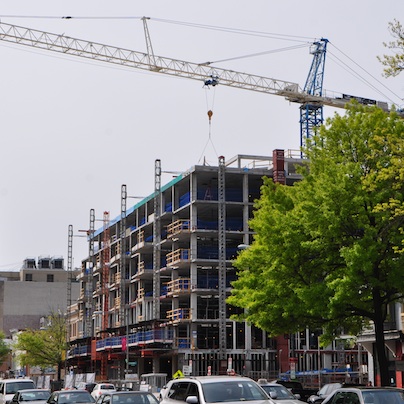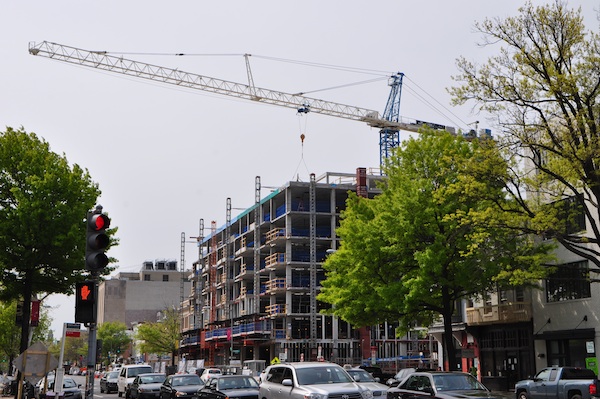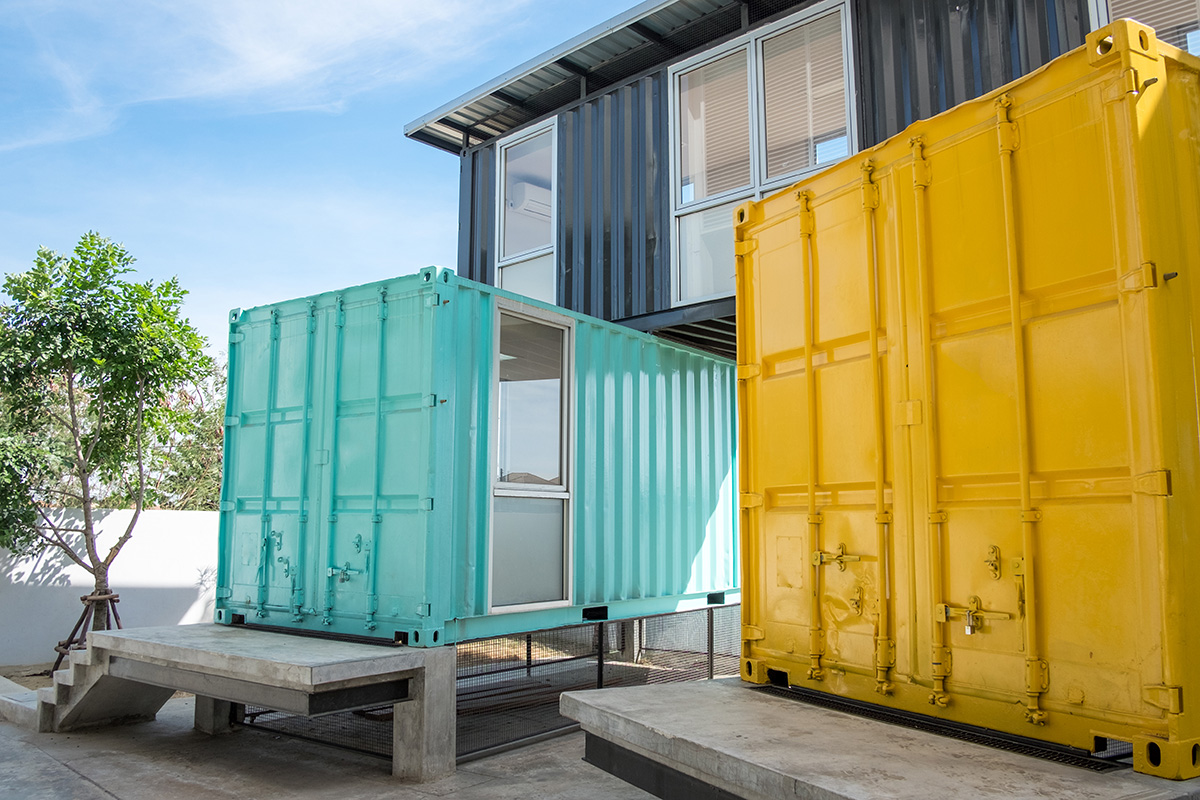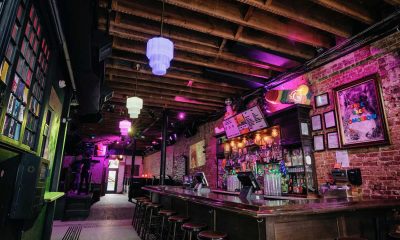Living
14th in flux
Rampant construction expected to bring hundreds of renters to Logan, beyond


A new apartment building being built across from the Black Cat on 14th Street NW in Washington. (Blade photo by Michael Key)
Construction on 14th Street N.W. in Washington is nothing new — anyone who frequents the uber-gay area has been seeing chain-link fences, closed sidewalks and cranes for months as various massive projects are underway. But with ground now broken for the Louis, the former Utopia spot at 14th and U that will be a mixed-use space featuring 267 new apartments and 30,000 square feet of retail street-level space, it feels like the whole stretch is one massive construction zone from about R to W.
With so many projects underway at once, what effect will all this ultimately have on the street? And what exactly is planned at each spot?
It’s an unusual part of town in the sense that past Thomas Circle and the downtown area, 14th varies extensively in character and nature. Much denser with commercial business than its 13th or 15th street neighbors, 14th encompasses parts of three different neighborhoods (Logan, Columbia Heights and the U Street corridor), several ANC zones and two city wards (one and two). It’s also a street that has seen massive change in the last decade. And if all the construction seems rather sudden, long-time residents and those following city zoning news know these projects have all been in the works for years. Much of the simultaneous ground breaking is due to financing now being more readily available than it was in the few years just after the 2008 stock market crash.
“Those of us who live here have known about these projects for five to six years,” says Ramon Estrada, the 2B09 ANC commissioner that encompasses part of the street. “When a project is approved by zoning, they have a two-year window but for some of these projects, that hit right in the middle of the recessions so they asked the ANC for extensions. We wanted these projects to be built so all we had to do was re-approve them.”
Among the projects underway are:
- The aforementioned Louis, a mixed-use project that will replace the Taco Bell/KFC and other shops formerly on the west side of 14th Street just south of U. The project, according to developer JBG, will be a nine-story, 267-unit apartment building with street-level retail space. JGB partnered with developer Georgetown Strategic Capital after their original plans stalled (the project was originally called Utopia). Construction started in February. JB and Georgetown Strategic Capital are working with architect Eric Colbert & Associates and interior designor Cecconi Simone on the project, according to Urban Turf, a site that monitors new condos and apartments coming to D.C.
- District Condos, another JBG project, is a 125-unit residential project being built at the corner of 14th and S, according to Urban Turf and other sources. This is the spot that was formerly a Whitman-Walker AIDS drop-in clinic. Originally planned as condos, the building will now be studio, one- and two-bedroom apartments.
- The massive Jefferson 14W project (Jefferson14w.com), a Perseus Realty and Jefferson Apartment Group project at 14th and W N.W. that will have 231 apartments, a 40,000 square-foot YMCA and 10,000 square feet of street-level retail that’s slated to be finished by fall.
- At 14th and Belmont (the 2400 block), a nine-story highrise that, according to the Prince of Petworth blog, will be 255 condos, street-level retail with underground parking and other amenities. This spot was formerly the Nehemiah Strip Mall.
- View 14 (view14.com) has been finished since 2010 (and has been sold) but still has retail space for rent and represents the new wave of development on the street. The 185-unit building was originally planned as condos but is now rental apartments.
- Level 2 Development plans a seven-story, 144-unit condo building at 1905 and 191714th Street, by the Carpet & Furniture shop. This project is more in the planning stage and has met with some opposition from residents.
- Two condo buildings are going in at14th and R — one in the Verizon building, the other in the former auto repair shop beside Miss Pixie’s. Look for between 30 and 40 condos in each.
Several gay D.C. residents the Blade spoke with said the changes are mostly positive.
“I think first of all on the14th Street corridor there was just enough land available for some of these really cool projects,” says Evan Johnson, a local Realtor who’s gay and has an eponymous real estate group. “Whether they’re apartments or condos, I’d obviously prefer condos since I’m in the sales side, but either way, the more residents it brings in, that brings the opportunity build more stores … I think it provides a tremendous opportunity to clean up some of the older buildings that needed attention and it’s still close enough to Dupont and Logan … that it’s a highly sought-after area. I don’t see any real negative impact.”
As the projects were being considered, City Councilmember Jim Graham (Ward 1) said he had some concerns, but they’ve been addressed.
“I’m certainly glad we’re keeping the post office,” Grahm, who’s openly gay, says. “They will have ground floor space with street access at the Reeve building. I welcome all this new activity because we have worked very hard and very successfully to keep our low income housing. Many of the big buildings north of Florida Avenue are low income apartment buildings which we have not only preserved, but they’ve also been rehabilitated all the way north of the Target. We haven’t lost that diversity and that’s very important as we welcome new people into the area.”
Tim Christensen, president of the Logan Circle Community Association and a Logan resident since 1989, says there are some concerns Logan residents have such as parking restrictions and extended hours for liquor sales, but he’s been active in voicing his concerns and those of his neighbors with their ANC elected officials.
“I’m a huge fan of mixed-use development and we’ve seen a lot of it in Logan through the years,” Christensen, who’s gay, says. “I think one of the biggest challenges for our businesses will be making sure they have enough foot traffic throughout the daytime on Mondays through Fridays. They’re fine in the evenings and on weekends when you have a lot of foot traffic, but if it’s very quiet in these areas during the work week, that can really mean the difference between success and failure for some of our businesses.”
And as for the hustle and bustle of the actual construction? Estrada says he hasn’t heard any significant grumbling about it.
“I think it’s just a temporary inconvenience. All of these neighbors are aware of the extent of how big these projects are so I think everybody is dealing with it just fine. I haven’t received any complaints.”
And why are so many rentals over condos? The reasons, observers say, are complicated. According to Mark Wellborn, editor-in-chief of Urban Turf, large projects have to meet certain sale/percentage benchmarks with non-government financing before they can proceed. Since government-backed financing through entities like FHA, Fannie Mae and Freddie Mac are how most buyers proceed, that can stymie construction. Projects with rentals don’t have the same requirements.
Observers predict the apartments, once finished, will rent for about $2,500 a month for a one-bedroom and will bring a 15-18 percent increase in residents to the area likely to match a similar spike the area saw since the 2000 census. The new residents are not expected to drastically alter the percentage of LGBT residents in Logan or Columbia Heights.
“I think it will be good for gay people overall,” Graham says.

Dear Michael,
I keep getting rejected on the apps. I don’t want to put myself out there anymore.
I don’t understand gay men. I think they behave really badly.
Guys stop replying in the middle of a text conversation and then un-match me. Guys don’t show up when we make a plan to meet. After a date or even a hookup that it seems clear we both enjoyed, I never hear from the guy again.
I am a pretty good looking and successful guy. I’m not a model or a billionaire but I’m sincerely wanting to date and eventually share a life with someone.
Unfortunately, everyone I am meeting, even if they say they have similar aspirations for a partner, acts like they’re looking over my shoulder for something better, and drops me for I-don’t-know-what reason.
I don’t have a lot of trust in the sincerity of gay men.
I know I sound bitter but I’ve been at this for a while and it keeps happening.
I know there’s a saying that if it keeps happening to you, you must be the problem. Logically that makes sense.
Except, I think this keeps happening so often and so predictably that it’s not me. These people hardly know me. It’s more along the lines of, if everything about me isn’t exactly what they want, or some little thing that I say, think, or do offends them, they vanish.
I’m lonely, but what’s out there is awful. Maybe it’s best to not keep trying.
If you have a different way of seeing it that’s honest, not just some fluff to make me feel better and be hopeful, please enlighten me.
Michael replies:
I agree with you, there is a lot of this kind of behavior out there. I hear stories similar to yours all the time. Though people do find great relationships online, relying on apps to meet a partner can be tricky.
Hookup apps have little to do with any kind of real connection. Often, they don’t even have much to do with sex. For a lot of people, they’re more about trying to fill up some kind of emptiness and seeking validation. They also, obviously, objectify men, which is the opposite experience of what you’re seeking.
And dating apps lend themselves to a sort of takeout menu concept of dating. You get to specify exactly what you’re looking for—a little of this, a lot of that, please omit something else—and then believe you should get what you ordered. As if that really exists. And when something isn’t just what you wanted, forget it.
But life doesn’t work that way. Nor do people: You can enter the exact criteria for the man of your dreams, but he will surprise you or let you down at times in some major ways. That’s how it goes. Part of being in a relationship is accepting that we all have to deal with imperfection.
All that said, hordes of people are going to keep using all sorts of apps and keep looking for “perfect” partners and keep ditching perfectly fine guys for the most minuscule of reasons.
But that doesn’t mean that you have to stay on the apps if it’s demoralizing you and leaving you hopeless.
Before you sign off, perhaps you would like to have some fun and be creative. Just for example, you could write in your profile that you’re interested in meeting a guy who isn’t looking for perfection and is looking for a decent soul rather than a set of stats. You still might encounter a lot of guys who ghost you for no apparent reason, but you also might have some luck finding a sincere someone with relationship goals that are similar to yours.
Another, complimentary strategy: Toughen up your attitude to stop letting let these rejections get under your skin. They have little to do with who you are (unless you are oblivious to some major issue about yourself), so you needn’t take them personally. In other words, expect this to keep happening; and when it does, laugh and keep moving forward.
I understand you are feeling like giving up on gay men in general. Keep in mind that while there are a lot of reasons why many gay men focus more on sex and less on commitment, that isn’t true across the board. In my work over the years, I have met many gay men who are looking for what you’re seeking. You could strive to be hopeful that if you keep looking, you are likely to cross paths with some of them.
And where you look may play a role.
Whether or not you stay on the apps, I suggest you seek additional ways to meet a potential boyfriend. Before apps existed, people did find other ways to meet romantic partners, and these ways do still exist. I know that this path is not an easy one. The whole dating endeavor isn’t easy. But difficult is not impossible.
There are social and activity groups for gay men that are organized around some sort of shared interest. They aren’t overtly sexual, so often attract people who are interested in and looking for a deeper connection. Even if you don’t meet a boyfriend there, you might make some like-minded friends, and one thing may lead to another in all sorts of ways.
There’s also plenty you can do as a human being (not simply as a gay man) in the offline world that might interest and even uplift you, where you just might meet a man you like. Again, you might also simply make some friends, and through having a bigger social life, might ultimately meet your guy.
Simply put: Don’t let yourself feel like or be a victim. Don’t keep putting yourself in miserable situations. And figure out what it means for you to do your best to make what you’d like to happen, happen.
Michael Radkowsky, Psy.D. is a licensed psychologist who works with couples and individuals in D.C., Maryland, Virginia, and New York. He can be found at michaelradkowsky.com. All identifying information has been changed for reasons of confidentiality. Have a question? Send it to [email protected].
Real Estate
New year, new housing landscape for D.C. landlords
Several developments expected to influence how rental housing operates

As 2026 begins, Washington, D.C.’s rental housing landscape continues to evolve in ways that matter to small landlords, tenants, and the communities they serve. At the center of many of these conversations is the Small Multifamily & Rental Owners Association (SMOA), a D.C.–based organization that advocates for small property owners and the preservation of the city’s naturally occurring affordable housing.
At their December “DC Housing Policy Summit,” city officials, housing researchers, lenders, attorneys, and housing providers gathered to discuss the policies and proposals shaping the future of rental housing in the District. The topics ranged from recent legislative changes to emerging ballot initiatives and understanding how today’s policy decisions will affect housing stability tomorrow.
Why Housing Policy Matters in 2026
If you are a landlord or a tenant, several developments now underway in D.C., are expected to influence how rental housing operates in the years ahead.
One of the most significant developments is the Rebalancing Expectations for Neighbors, Tenants and Landlords (RENTAL) Act of 2025, a sweeping piece of legislation passed last fall and effective December 31, 2025, which updates a range of housing laws. This broad housing reform law will modernize housing regulations and address long-standing court backlogs, and in a practical manner, assist landlords with shortened notice and filing requirements for lawsuits. The Act introduces changes to eviction procedures, adjusts pre-filing notice timelines, and modifies certain tenant protections under previous legislation, the Tenant Opportunity to Purchase Act.
At the same time, the District has expanded its Rent Registry, to have a better overview of licensed rental units in the city with updated technology that tracks rental units subject to and exempt from rent control and other related housing information. Designed to improve transparency and enforcement, Rent Registry makes it easier for all parties to verify rent control status and compliance.
Looking ahead to the 2026 election cycle, a proposed ballot initiative for a two-year rent freeze is generating significant conversation. If it qualifies for the ballot and is approved by voters, the measure would pause rent increases across the District for two years. While still in the proposal phase, it reflects the broader focus on tenant affordability that continues to shape housing policy debates.
What This Means for Rental Owners
Taken together, these changes underscore how closely policy and day-to-day operations are connected for small landlords. Staying informed about notice requirements, registration obligations, and evolving regulations isn’t just a legal necessity. It’s a key part of maintaining stable, compliant rental properties.
With discussions underway about rent stabilization, voucher policies, and potential rent freezes, long-term revenue projections will be influenced by regulatory shifts just as much as market conditions alone. Financial and strategic planning becomes even more important to protect your interests.
Preparing for the Changes
As the owner of a property management company here in the District, I’ve spent much of the past year thinking about how these changes translate from legislation into real-world operations.
The first priority has been updating our eviction and compliance workflows to align with the RENTAL Act of 2025. That means revising how delinquent rent cases are handled, adjusting notice procedures, and helping owners understand how revised timelines and court processes may affect the cost, timing, and strategy behind enforcement decisions.
Just as important, we’re shifting toward earlier, more proactive communication around compliance and regulatory risk. Rather than reacting after policies take effect, we’re working to flag potential exposure in advance, so owners can make informed decisions before small issues become costly problems.
A Bigger Picture for 2026
Housing policy in Washington, D.C., has always reflected the city’s values from protecting tenants to preserving affordability in rapidly changing neighborhoods. As those policies continue to evolve, the challenge will be finding the right balance between stability for renters and sustainability for the small property owners who provide much of the city’s housing.
The conversations happening now at policy summits, in Council chambers, and across neighborhood communities will shape how rental housing is regulated. For landlords, tenants, and legislators alike, 2026 represents an opportunity to engage thoughtfully, to ask hard questions, and to create a future where compliance, fairness, and long-term stability go hand-in-hand.
Real Estate
Unconventional homes becoming more popular
HGTV show shines spotlight on alternatives to cookie cutter

While stuck in the house surrounded by snow and ice, I developed a new guilty pleasure: watching “Ugliest House in America” on HGTV. For several hours a day, I looked at other people’s unfortunate houses. Some were victims of multiple additions, some took on the worst décor of the ‘70s, and one was even built in the shape of a boat.
In today’s world, the idea of what a house should look like has shifted dramatically. Gone are the days of cookie-cutter suburban homes with white picket fences. Instead, a new wave of architects, designers, and homeowners are pushing the boundaries of traditional housing to create unconventional and innovative spaces that challenge our perceptions of what a home can be.
One of the most popular forms of alternative housing is the tiny house. These pint-sized dwellings are typically fewer than 500 square feet and often are set on trailers to allow for mobility. Vans and buses can also be reconfigured as tiny homes for the vagabonds among us.
These small wonders offer an affordable and sustainable living option for those wishing to downsize and minimize their environmental footprint. With clever storage solutions, multipurpose furniture, and innovative design features, tiny homes have become a creative and functional housing solution for many, although my dogs draw the line at climbing Jacob’s Ladder-type steps.
Another unusual type of housing gaining popularity is the shipping container home. Made from repurposed shipping containers, these homes offer a cost-effective and environmentally friendly way to create modern and sleek living spaces. With their industrial aesthetic and modular design, shipping container homes are a versatile option for those contemplating building a unique and often multi-level home.
For those looking to connect with nature, treehouses are a whimsical and eccentric housing option. Nestled high up in the trees, these homes offer a sense of seclusion and tranquility that is hard to find in traditional housing. With their distinctive architecture and stunning views, treehouses can be a magical retreat for those seeking a closer connection to the natural world.
For a truly off-the-grid living experience, consider an Earthship home. These self-sustaining homes use recycled construction materials and rely on renewable energy sources like solar power and rainwater harvesting. With their passive solar design and natural ventilation systems, Earthship homes are a model of environmentally friendly living.
For those with a taste for the bizarre, consider a converted silo home. These cylindrical structures provide an atypical canvas for architects and designers to create modern and minimalist living spaces. With curved walls and soaring ceilings, silo homes offer a one-of-a-kind living experience that is sure to leave an impression.
Barn homes have gained popularity in recent years. These dwellings take the rustic charm of a traditional barn and transform it into a modern and stylish living space. With their open, flexible floor plans, lofty ceilings, and exposed wooden beams, barn homes offer a blend of traditional and contemporary design elements that create a warm and inviting atmosphere, while being tailored to the needs and preferences of the homeowner.
In addition to their unique character, barn homes also offer a sense of history and charm that is hard to find in traditional housing. Many of them have a rich and storied past, with some dating back decades or even centuries.
If you relish life on the high seas (or at a marina on the bay), consider a floating home. These aquatic abodes differ from houseboats in that they remain on the dock rather than traverse the waterways. While most popular on the West Coast (remember “Sleepless in Seattle”?), you sometimes see them in Florida, with a few rentals available in Baltimore’s Inner Harbor and infrequent sales at our own D.C. Wharf. Along with the sense of community found in marinas, floating homes offer a peaceful retreat from the hustle and bustle of city life.
From tiny homes on wheels to treehouses in the sky or homes that float, these distinctive dwellings offer a fresh perspective on how we live and modify traditional thoughts on what a house should be. Sadly, most of these homes rely on appropriate zoning for building and placement, which can limit their use in urban or suburban areas.
Nonetheless, whether you’re looking for a sustainable and eco-friendly living option or a whimsical retreat, there is sure to be an unconventional housing option that speaks to your sense of adventure and creativity. So, why settle for a run-of-the-mill ranch or a typical townhouse when you can live in a unique and intriguing space that reflects your personality and lifestyle?
Valerie M. Blake is a licensed Associate Broker in D.C., Maryland, and Virginia with RLAH @properties. Call or text her at 202-246-8602, email her at [email protected] or follow her on Facebook at TheRealst8ofAffairs.




















